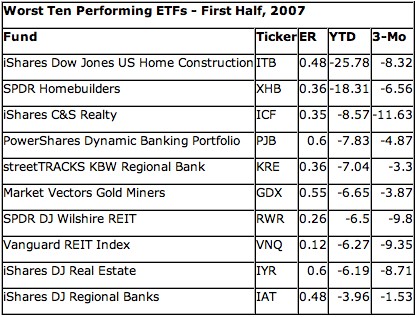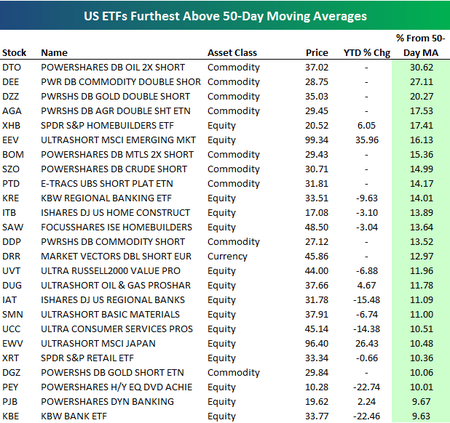ETF List
Post on: 12 Май, 2015 No Comment

An exchange-traded fund (ETF) is an investment that represents a pool of securities and can be bought and sold on a stock exchange in the same manner that company stocks are. The first ETFs were designed to efficiently track inportant stock market indices such as S&P 500 or the NASDAQ 100, although as more and more ETFs are created, they have become progressively more diverse and more specialized. Today there are hundreds of ETFs, providing the average investor with simple, inexpensive and less risky access to areas such as stock futures, short selling, global stock exchanges, corporate bonds, currency trading and commodity trading .
Because there is a mechanism for issuing and redeeming shares, and because the holdings of ETFs are transparent, arbitrage is possible between the ETF price and the value of its underlying holdings. This means that an ETF will normally trade at a price very close to its net asset value (NAV) .
In concept, an ETF is much like a mutual fund. The advantages of ETFs are that they can be bought and sold at any time, and that fees are much lower — there is no front- or back-end load, and the majority of ETFs charge low management fees in the range of 0.25% and 0.75% per year. However, as with trading stocks, an investor must also consider costs due to brokerage fees and the bid-ask spread.
en.wikipedia.org/wiki/Exchange-traded_fund .
Related Investment Types:
Exchange-Traded Notes
Stock-encyclopedia.com also covers exchange-traded notes (ETNs). These are unsecured debt securities issued by underwriting banks and traded on U.S. exchanges: in effect, the bank is promising to pay back the note holder the full amount of the benchmark being tracked, less fees and expenses. ETNs function in much the same way as ETFs, with a couple of notable differences.
The advantages ETNs have over ETFs is that they will track the benchmark index without error (whereas ETFs have to actually mimic a benchmark and might not be able to reproduce its behavior exactly), and that they are designed to be more tax efficient. However this tax efficiency is somewhat speculative, dependant upon how the U.S. Internal Revenue Service chooses to treat them, and it may not have a beneficial effect for foreign investors.
A significant disadvantage of ETNs is that they are subject to counterparty risk. i.e. their value is dependant upon the credit rating of the issuing bank. In theory the issuing bank could become insolvent and the notes become worthless.
en.wikipedia.org/wiki/Exchange-traded_note .

Closed-End Funds
Stock-encyclopedia.com does NOT currently cover closed-end funds (CEFs). These funds also represent pools of securities and trade on stock exchanges, but they have a fixed number of shares outstanding so there is no arbitrage mechanism keeping their share price close to their net asset value. Such funds can trade at either a discount or premium to their underlying value of as much as 20% or more. Thus each CEF is subject to significant swings that reflect imbalances in the supply and demand of it as an investment vehicle — over and above any change in the intrinsic value of its holdings.
en.wikipedia.org/wiki/Closed-end_fund .
Other sources of information
Stock-encyclopedia.com is primarily aimed at having as complete and fully cross-referenced list as possible of ETFs traded in the U.S. Canada and the U.K. You may be interested in the additional information and tools at these sites:














